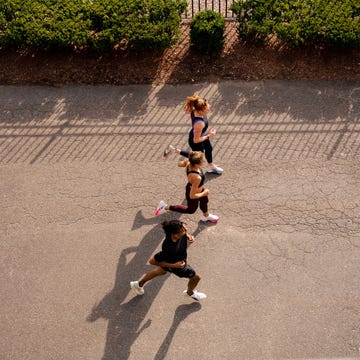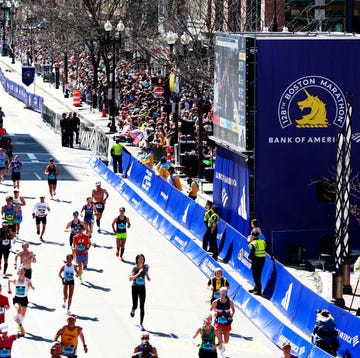Qualifying for the Boston Marathon is a grit meter for me. I have raced it every year since 2013 and will continue to do so as long as I make the cut.
Streaking the world’s oldest marathon for over 10 years has been an honor—and a privilege. Throughout that time I saw how it changed after the 2013 bombing, raced both years Meb Keflezighi and Des Linden won their laurels, and ran virtually during the pandemic.
Boston is the holy grail for many runners. Every year, Boston-hopefuls train to meet qualifying times, only for some to get shut out by the influx of much faster registered runners. For the 2025 race, you had to run 6:51 faster than the actual Boston qualifying time (BQ) for your age group. Every couple of years, the time standard goes down, making qualifying even harder. But outside of the 10 percent of the field-size registration that’s open to charity runners, improving your marathon pace is the only way in.
When I attended a four-day-long camp that was organized by women’s running apparel company Oiselle in 2023, fellow participants and I discussed the Boston Marathon at length. Oftentimes in the mess hall, they ruminated on when it would be their time to qualify and whether they’d have to wait until they turned a certain age, when the time standard would be more attainable.
There are some, however, who see the BQ as another aspect of the Boston Marathon’s elitist culture. Inverse to my Oiselle camp experience, I dined with runners during the 2024 Boston Marathon weekend who wanted the BQ abolished and replaced with a lottery, like the New York City and Chicago marathons’ way of entry.
In her 2022 book Running While Black, Alison Mariella Désir discusses how Boston’s qualifying time is a form of exclusivity. “The race is only open to those who run fast enough to earn a spot, unless you run for a charity and can fundraise thousands of dollars. Speed makes you ‘worthy’ of Boston,” the activist and Harlem Run founder writes. “What is white supremacy ultimately, but an ideology of exclusion, of thinking you’re ‘special,’ above all the rest?” Désir also describes how she was invited to run the race as a part of a women’s group to celebrate the 45th anniversary of women running Boston, in 2017, and how some women in her group received pushback for being offered a bib without qualifying.
While I’m not in the same camp as those who wish to eliminate the time standard, I throw shame on a crowd that wishes to gatekeep and cast out runners who are given an opportunity to participate in this historic race.
In 2018—my first year at Runner’s World—readers sent in scathing messages after I wrote an article on banditing, admitting to running Boston without a bib eight years earlier. “As a race director, I pray there is a special place in hell for bandits,” wrote one commenter. “The Boston Marathon should send Amanda a bill for the 2010 entry fee plus interest,” wrote another. I was fresh out of college that year, 22 years old, and, thanks to the recession, with no job prospects. Maybe it was because I felt directionless that I went along with my XC teammates who decided to bandit the marathon.
I understand that banditing and receiving a bib without BQ’ing aren’t the same. I don’t approve of banditing and wouldn’t do it today. Races have become too big—and too expensive—to handle unregistered crowds; banditing limits resources and is hazardous to both registered and unregistered runners in times of emergencies. But before the 2013 bombings on Boylston Street, banditing was a tolerated pastime. Race officials looked the other way when they saw bibless runners on the course. We—rightfully—didn’t get medals to commemorate our finish. Completing was our reward. It inspired me to attempt to BQ at the 2012 Disney Marathon. That spark I felt ignited a fire I don’t wish to take away from anyone who receives a bib without qualifying.
I understand Boston’s lure: the opportunity to run a historical race; the pride of running fast enough to register. But gatekeeping the racing experience from those regarded as “unworthy”—charity runners and runners given a bib like Désir—is a poor reflection of the running community as a whole. Holding a race so sacred that we drag runners through the mud if they don’t fit our version of “qualifying” was never—at least to me—what the marathon was about.
If you’re so focused on who is allowed to run, then maybe, somewhere down that road of going after that unicorn, you got lost in the chase.
Amanda Furrer, Editor, Running Reviews, studied journalism at NYU and writing at Emerson College. She has reviewed gear and covered other topics in the running space for almost 10 years. Since 2013, she has consecutively run the Boston Marathon. She also has a master’s degree in gastronomy from Boston University and was formerly a professional baker for two years before hanging up her apron.













